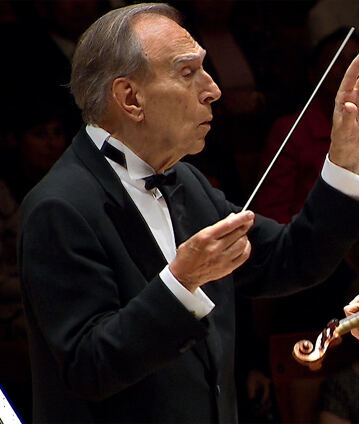Claudio Abbado conducts works by Schumann and Berg

In this concert, Claudio Abbado conducts music full of sensitivity, including Robert Schumann’s Second Symphony, a highly sensitive piece, full of fragile nervousness. He is joined by two top-class soloists in works by Alban Berg: mezzo-soprano Anne Sofie von Otter in the Altenberg-Lieder, and in the Violin Concerto, Isabelle Faust, who impressed the audience with her “soaring, almost halucinatory tone” (Frankfurter Allgemeine Zeitung).
Whenever Claudio Abbado and the Berliner Philharmoniker performed works by Robert Schumann, it was mostly rarities that were to be heard: the Szenen aus Goethes Faust, or the melodrama Manfred. And the overture to Schumann’s opera Genoveva, which Abbado presented at this guest performance in the Philharmonie, was probably also a discovery for most people. On the other hand, the concert ends with one of the composer’s most popular works: his Second Symphony.
Schumann composed the symphony at the end of 1845, when he was suffering from the effects of severe depression. “It seems to me that one must hear that in it,” was how he judged it himself. And in fact this is highly sensitive music that seems, for example in the Adagio espressivo of the third movement, as if the real world is left ever more behind. Other sections come across as more robust, more confident – but a fragile nervousness constantly emerges. However, the symphony should not be understood as a “musical medical report,” but as a particularly impressive document of Romantic sensibility.
The second composer in the programme is Alban Berg, who repeatedly devoted himself to the works of Schumann. Many of Schumann’s characteristics have since been revealed in Berg’s own style. To the ear, the influence is conveyed more in the authentic sensitivity that is characteristic of both composers. In Berg’s case, this is exemplified in the Altenberg-Lieder and in the Violin Concerto, which is performed in this concert. To explore the emotional depth of these works, the services of two outstanding soloists were secured: the mezzo-soprano Anne Sofie von Otter and the violinist Isabelle Faust.
© 2012 Berlin Phil Media GmbH
Related interviews
Artists
Our recommendations
- Robert Schumann’s Violin Concerto with Isabelle Faust and Sakari Oramo
- Peter Eötvös and Isabelle Faust
- Simon Rattle conducts Mahler’s “Das Lied von der Erde”
- Claudio Abbado conducts music from “Carmen” at the 1997 New Year’s Eve Concert
- Concert with Claudio Abbado to mark the 100th anniversary of Gustav Mahler’s death
- Simon Rattle conducts Wagner’s “Götterdämmerung” at the Festival d’Aix-en-Provence